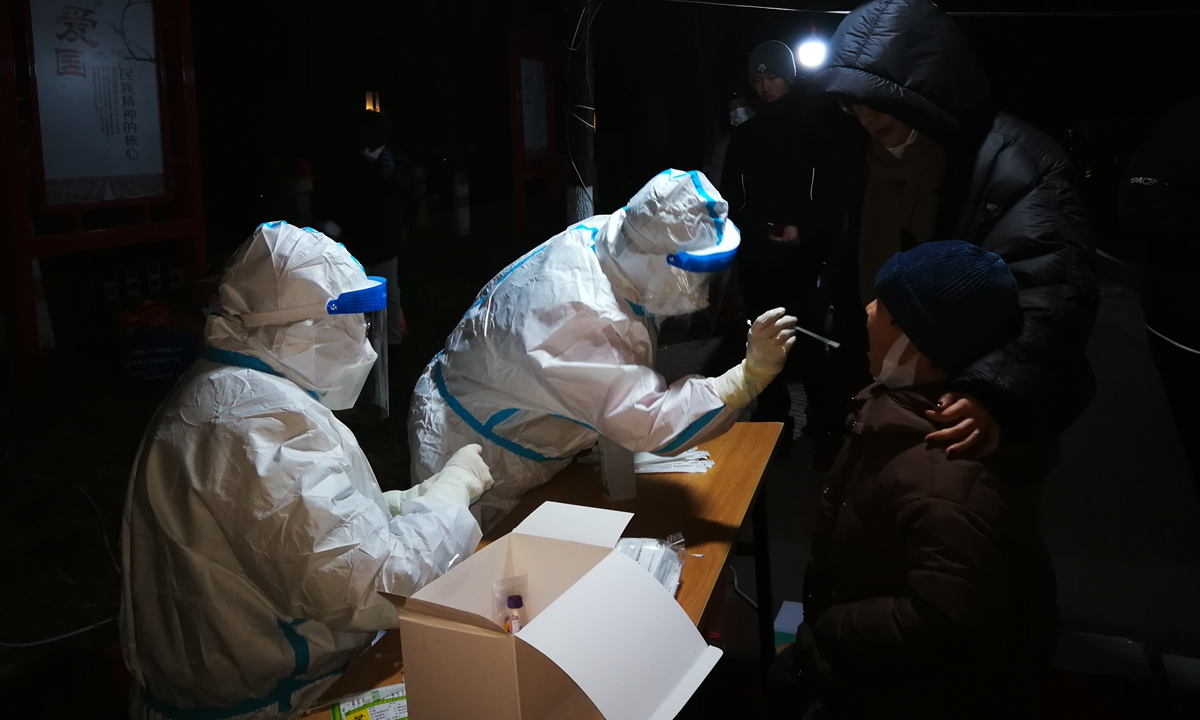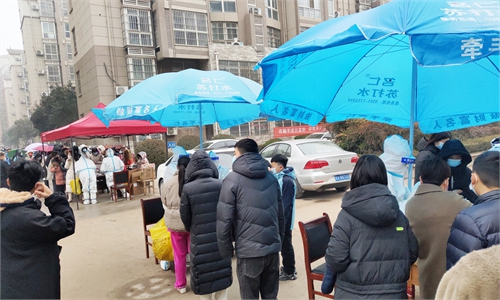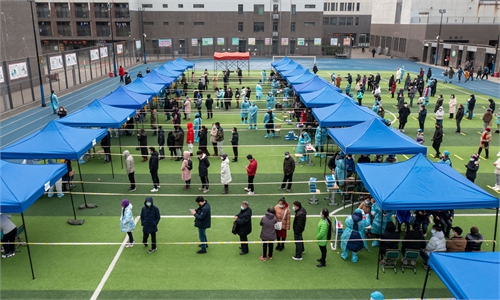
Residents take nucleic acid tests in Tianjin on January 9, 2022. Photo: VCG
North China's Tianjin Municipality has tightened travel restrictions by taken measures such as suspending all inter-provincial highway passenger bus services and charter services toward Beijing to contain the spread of the highly transmissible Omicron variant. The city has so far reported 97 cases of COVID-19 amid the new wave, the local authorities said on Tuesday.
As of noon of Tuesday, a total of 97 residents in Tianjin have tested positive for COVID-19, including 49 local confirmed cases and 15 asymptomatic cases, while 33 positive cases require further verification, according to the authorities during Tuesday's press briefing.
Under the new wave of Omicron, one student has infected more than 10 other people. However, Omicron infection cases often have mild symptoms, with asymptomatic cases accounting for about 30 percent, and those with mild symptoms accounting for about 50 percent, with 20 percent being ordinary cases. There are also fewer severe cases, said Zhang Boli, an academician with the Chinese Academy of Engineering and also a top medical adviser who fought against the outbreak in Wuhan, Central China's Hubei Province, at the press briefing.
Most patients have suffered from severe symptoms of the upper respiratory tract including coughing and sore throats, Zhang noted. Compared with the other variants, Omicron spreads faster and hides well among the masses.
Traditional Chinese medicine (TCM) will play a larger role in the treatment of Omicron, based on previous experience, especially given that treatment overseas has achieved good results with obvious improvement in symptoms such as fever, sore throat and coughing, Zhang said.
After receiving TCM treatment, the time needed to return a negative test is relatively fast, and the likelihood of returning a positive test for the virus is relatively low, indicating that the therapeutic effects of TCM are beneficial, according to Zhang.
A total of 279 inspection sites have been set up on roads, and residents are required to provide negative nucleic acid test certificates taken within 48 hours and other health-related information being leaving Tianjin.
Some train stations in Tianjin took control measures such as suspending the operation and sale of train tickets toward Beijing. From Tuesday, tourists are allowed to refund their train tickets starting from Tianjin at railway stations or online without charge, the authorities said.
Since Monday, passengers traveling through Tianjin Binhai International Airport must present a negative nucleic acid test certificate taken within 48 hours, departure certificate and other health information.
Along with the current preventive and control measures, stricter measures will be adopted for passengers travelling to Beijing such as health codes and temperature checking on trains.
The first round of city-wide nucleic acid tests tested 11.91 million samples taken from residents, with 7.89 million samples already returned including 77 positive cases, according to the authorities.
Based on data from the current 80 confirmed local cases, the ages of patients ranged from five to 74 years old, according to the authorities. Since January 6, there have been six family gathering cases reported. Among the 80 cases reported, one child hadn't been vaccinated for COVID-19, three patients had been administered one dose of vaccine while the other 76 patients had received two vaccine doses. In addition, 20 people had received booster vaccines.
Three residential communities in Tianjin heightened their COVID-19 risk levels to high on Tuesday, according to the municipal government. Five residential communities were classified as medium-risk for COVID-19.
It is optimistic to expect that the epidemic situation in Tianjin will ease and there will be no new cases before the Chinese Spring Festival, Zhang said, suggesting that residents should avoid large-scale gatherings in the meantime.


